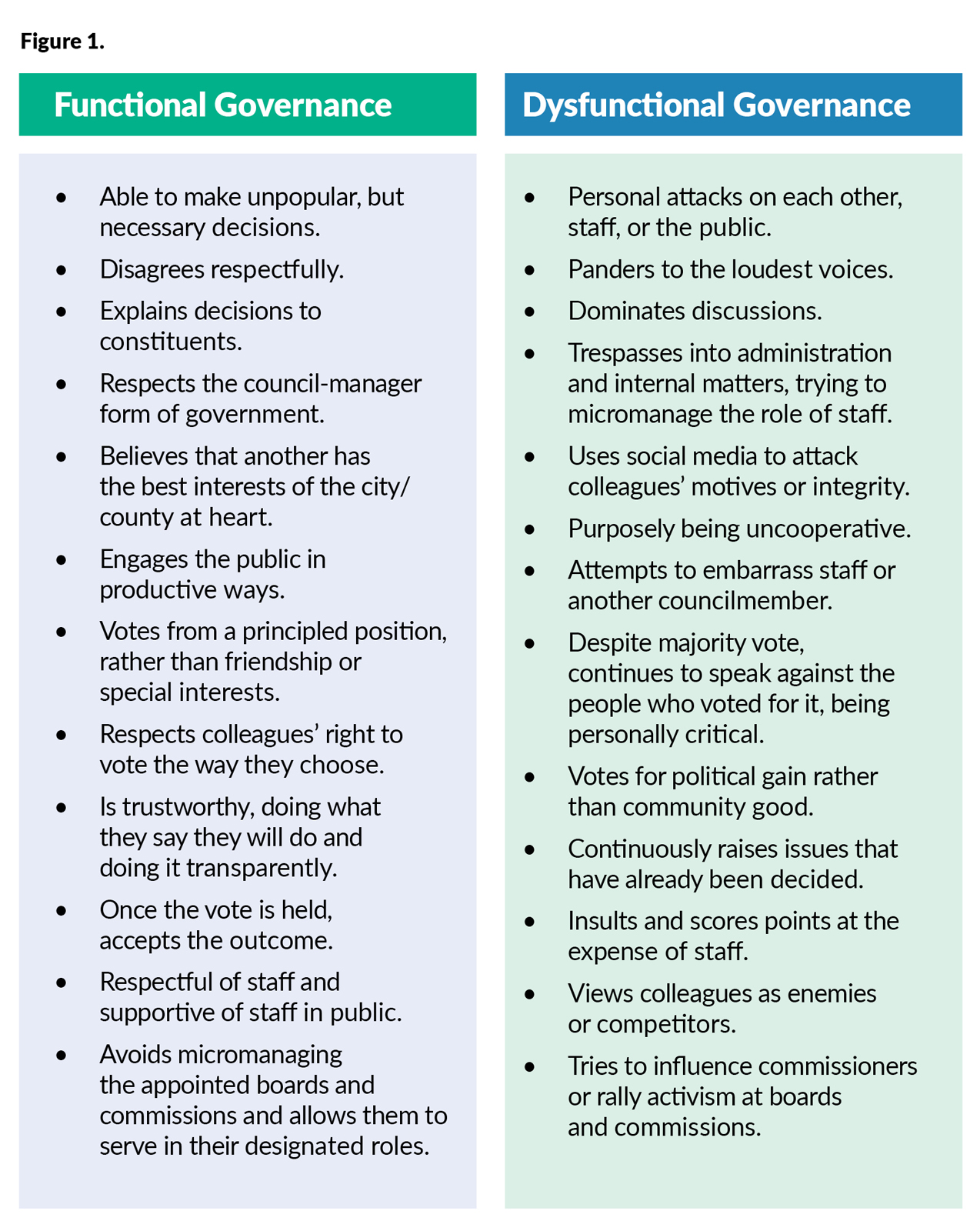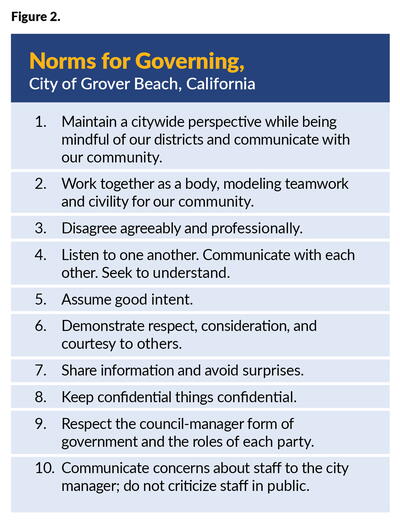
The ideal governing body is one where all members follow agreed-upon norms, set goals and stick to them, respect the council-manager form of government, operate with high integrity and civility, and are mindful of staff capacity when new work is desired. It’s a council or elected commission that stays focused on having alignment to get important things done for the community.
Not every governing body matches this ideal. Sometimes a councilmember acts like they can go it alone or they try to take over the role of staff. Some elected officials can be rude and disrespectful, lashing out at staff or their colleagues. They can filibuster at council meetings. Or despite the council vote, continue to work against the decision, or take their anger out on staff about the council action.
Community members expect their elected officials to work together to achieve important goals, to exercise fiduciary responsibilities, serve with ethics and integrity, to support a professional staff who can provide services, to operate transparently on behalf of all, and to work for the greater good. Prospective businesses want predictability and confidence that decisions made by the governing body will be well thought through and will be sustained.
The chief executive must consistently convey that everyone within the local government is there to serve the community, and that the community is at the center of their purpose. A council’s dysfunction can permeate through the organization and community. If our leaders do not treat each other or staff with respect, members of the community may well mimic this behavior. The chief executive can make clear that they champion differences of opinions—that is the beauty of democracy. But when discussing issues, it must be done respectfully.
One city manager said, “I remind the council that they all have one thing in common, and that is the love for the community we serve. We all love it differently. It seems to anchor a more civil and respectful dialogue on the dais and with staff.”
What are the consequences of a dysfunctional governing body?
• Economic development can be stymied.
• Recruitment of new executive and managerial staff is impeded.
• The organization may have to pay more to get top staff.
• Turnover increases, especially among the staff who must interact with the council, which over time is expensive.
• Incivility among community members can increase.
• Appointed board and commission members take their cues from the council and could begin acting in the same dysfunctional ways.
Figure 1 details some key differences between a functional governing body and a dysfunctional one.

What can the chief executive do to help a governing body function well and to bring an outlier councilmember into the fold? This is not to say that the chief executive can solve the problem of the disruptive elected official, but there are steps that can be taken.
1. Engage your council in developing a set of agreed-upon norms for governing.
These are behaviors that all members agree are important for productive governance. Using a neutral facilitator can be helpful in creating these norms. Figure 2 shows a great example from the city of Grover Beach, California, which was adopted in March 2025.
2. Develop a policy and procedures manual for the governing body.
Among other things, this would include norms, a code of ethics, specific protocols for meetings, and steps that can be taken when councilmembers do not follow the rules, depending on the level of severity of the infraction.
A policy and procedures manual should also be focused on the elements that help support the appearance of a more professional governance structure. The manual should serve as a resource that is not just focused on that rogue councilmember, but instead as a tool to help on-board new councilmembers, especially those that do not have experience in a governance setting. Review and update it annually based upon the issues facing the respective organization. The manual is a document that the city/county manager will find themselves referring to regularly so as to promote consistency among all members of the council. The manual adopted by the city of Victorville, California, is a good example.
3. Orient new governing body members to the “how” of governance along with “what” the municipality does.
These sessions are essential. Discuss roles of the elected officials as policy makers and the role of the chief executive in running the organization. Review roles, norms, and the policy and procedures manual. Explain the “why” of those. Refer to best practices, such as attributes of effective governance teams from the Institute for Local Government.
In Victorville, the city manager conducts onboarding sessions with all newly elected councilmembers. He includes a formal resource document, video trainings, introduction sessions with department heads, and facility/operation tours. The resource document introduces the new member to the city charter and municipal code. It includes an organizational overview, a description of the appointed bodies and their respective roles, an introduction to the budget and how it works, along with the council-adopted policies and procedures manual and strategic plan. Video trainings include, among other things, councilmember duties and responsibilities and effective city manager/council relationships. To be respectful of a new member’s time, these trainings can be scheduled over the course of a month or two.
4. Reinforce roles.
Focus the council on their policy and leadership roles and remind them that the city manager runs the organization. A city or county government is a municipal corporation, and the governing body is the board of directors of a multi-million dollar corporation. Their meetings are business meetings and the place to make business decisions. It is not their role to get into the day-to-day details of operations or to criticize staff. High-performing councils understand that they can do great work for their communities by being leaders representing their city/county at the regional, state, and national level.
5. Provide training to the mayor or board chair in running the meetings.
This should also include guidance on how to handle a disruptive elected official as well as members of the public. Some agencies prepare a script or conduct mock council meetings for a new mayor. Your agency’s legal counsel can be helpful with this training.
6. Meet regularly with each member.
For the outlier who might try to avoid these meetings, find ways to meet them on their turf. Find a place that works for him or her. Meet for breakfast or lunch. Go to their business. Don’t avoid this person; listen and learn about their concerns. Assume good intent and that the member does wish the best for the community and even the organization. Look for common ground. There may be some underlying issues of concern to the outlier governing body member that do need to be addressed. If rude or disrespectful behavior is the problem, address it directly with the person. If the repeated issues have merit, deal with those in a productive way.
7. Have a strategic plan with clear goals and agreed-upon strategies.
This provides the policy and budgetary context for what individual councilmembers may wish to achieve. Find out what each member’s priorities are and help them achieve some wins within this framework. It is important to understand all members’ interests, including the disrupter’s, and help them get those met in a productive way.

8. Provide guidance to your staff.
This helps to ensure that individual department heads are not being “picked off” by the outlying councilmember. Establish clear protocols for how you want your council to communicate with you and your staff, including what is not acceptable. Make sure your staff understands your expectations.
9. Ensure that staff reports are top quality and professional.
A resource for this is Mastering the Art: A Step-by-Step Guide to Writing a Quality Staff Report, by Tamara Letourneau, city manager of Laguna Niguel, California. The city of Victorville has prepared a resource document and video training presentation, Fundamentals on Writing a Staff Report, providing guidance on writing a staff report as if it were a disclosure document, providing sufficient background and detail for the elected body to make an informed decision.
10. Stand up for staff.
Let the council know that “staff bashing” is not acceptable and that you will take steps to protect staff if needed. For instance, if a councilmember becomes disrespectful and rude to staff at a council meeting, call for a recess. Have the staff member leave the room; or when everyone returns from the recess, let the council know you’ve taken over the questions and answers, and they are to direct all questions to you. You can return with answers at the next meeting. Advise the council that you will take these steps if staff are not treated respectfully, and then do it.
11. Resist the rest of the council’s demands for you to “fix the problem.”
Encourage governing body members to speak individually with the colleague with whom they are having problems. They should be encouraged to talk with their colleague about the impact of their actions, not the intent.
12. After a rough council meeting, follow up with each member of council to take a “pulse check.”
This is important information for you. How are they feeling? Are there steps they could be taking? What could you be doing?
And as always, behave professionally and lead by example. This means treating all governing body members equally. It also means not allowing demeaning statements or disruptions to impede the work of the organization. Sometimes it means that you will need to stand up to someone who is behaving like a bully, and enlist the help of the rest of the board or council. Don’t avoid having candid conversations with your elected officials.
But What If Things Get Extreme?
Sometimes even the best procedures, trying to find common ground, and appealing to each elected official’s better side just doesn’t work. One or more may just be a disrupter. Yet the governing body must be able to govern and not allow one person to take over the process. When that happens, there are alternatives to be considered. These are not to be taken lightly but some circumstances can arise in which they become necessary.
Executive Session
If allowed by state meeting laws, this would be called by the board chair or mayor with the purpose of the entire governing body discussing the concerns with the disruptive councilmember. This session should be a conversation with each member of the governing body speaking, and the disruptive councilmember should have an opportunity to respond. The goal of this session would be to reach agreement on behaviors.
Censure
A policy and procedure for censure would be in the governing body’s adopted rules and policy manual. The adopted policy should be specific as to the steps that would be taken, including the process by which allegations are stated, a majority of the governing body supports moving forward with either a hearing or investigation, and the censure process is conducted. A censure is no guarantee that the behavior will stop, but it is a clear statement by the governing body that the behavior is not condoned.
Limiting Access to City Hall
The adopted rules and policy manual can include prohibition of the governing body from being in city offices except during business hours and the official governing body meetings. This can be necessary when an elected official is combative with staff or the public in city hall and behaving in a disruptive manner. In Victorville, the city manager uses both the policies and procedures manual and its authority provided under the municipal code to restrict councilmember access to city hall to posted working hours and official governing body meetings. To avoid the potential for the rogue councilmember alleging that they are being treated discriminatorily, it is helpful to have the same access restrictions in place for all councilmembers.
Conclusion
These situations are stressful. Our tips are not intended to suggest that the path will be easy, but ignoring the situation rarely makes thing better. Leadership is needed and you as the chief executive will need to be the one to do what you can within your role to help foster functional governance. It matters to your community and your governing board, and it matters to your staff. It is also important to take care of yourself during these difficult times. Talk to your mentor, friends, and/or colleagues in confidence. Know that you are not alone.
JAN PERKINS, ICMA-CM, is vice president of Raftelis, a local government management consultant and facilitator, former city manager, and a believer in good government and in the city management profession. (jperkins@raftelis.com)
KEITH METZLER is city manager of Victorville, California, USA. (kmetzler@victorvilleca.gov)
New, Reduced Membership Dues
A new, reduced dues rate is available for CAOs/ACAOs, along with additional discounts for those in smaller communities, has been implemented. Learn more and be sure to join or renew today!
